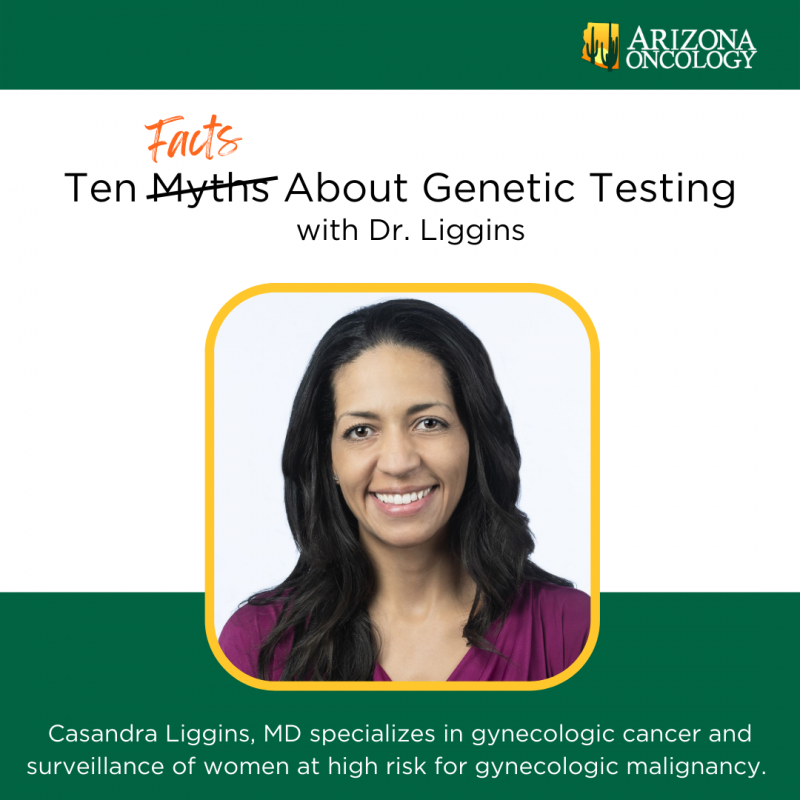Most people have heard about genetic testing when it comes to cancer risk, but there is a lot of misinformation. Today, gynecologic oncologist Casandra Liggins, MD joins us to bust the myths about genetic testing and share the facts.
MYTH #1: Most Cancers are Genetic
FALSE. The majority of patients who develop cancer do not have a genetic predisposition. “Genetic inheritance plays a role in approximately five to ten percent of cancers,” Dr. Liggins explains. When it comes to breast cancer in particular, five to ten percent of breast cancer patients have an identified gene, although another ten to 15 percent of patients will have a familial correlation, even though the gene is not present.
MYTH #2: Everyone Should Get Genetic Testing for Cancer
FALSE. Given the limits of genetic testing, it does not make sense for the general population to get tested. “It’s not always beneficial, nor informative,” Dr. Liggins explains. Genetic testing recommendations are established by the National Comprehensive Cancer Network (NCCN) and other organizations that look at the data and adjust guidelines on a yearly basis.
Dr. Liggins adds that the risk of cancer is more influenced by environmental factors and lifestyle choices (the largest threats being obesity and smoking) than it is by genetics. For that reason, the focus for the majority of the population should be on those preventable factors.
MYTH #3: BRCA gene mutations only relate to breast cancer
FALSE. Mutations in the BRCA 1 and 2 genes are linked to various cancers, including breast, ovary, prostate, pancreatic, and melanoma. People who inherit harmful variants of a BRCA gene have increased risks of developing one of these cancers, and also tend to develop cancer at younger ages than people who do not have a variant.
MYTH #4: If I have a BRCA1 or BRCA2 gene mutation, I will get cancer (and if I do not, I will not)
FALSE. “Genetic inheritance is just a piece of the puzzle,” Dr. Liggins says. “Having an inherited genetic mutation in any gene can increase an individual’s lifetime risk of cancer, but does not guarantee an individual will get cancer.”
The National Cancer Institute provides an example: “About 13% of women in the general population will develop breast cancer sometime during their lives. By contrast, 55%–72% of women who inherit a harmful BRCA1 variant and 45%–69% of women who inherit a harmful BRCA2 variant will develop breast cancer by 70–80 years of age.”
MYTH #5: Only women need genetic testing
FALSE. Many common cancers in men are genetically linked, specifically pancreatic, prostate, and colon cancer. By finding out their genetic profile, both men and women can take steps to reduce their risk in other areas and start cancer screening earlier, if needed, which could save their life. “Cancer is not gender specific,” Dr. Liggins reminds us.
MYTH #6: Genetic testing is not accurate
FALSE. The companies performing genetic testing for cancer have standardized and accurate testing. “No test is 100% accurate,” says Dr. Liggins, “But we have come a long way in our ability to identify inherited genetic mutations, and the field will continue to develop.”
Genetic testing at its current stage has helped many people identify inherited gene mutations and take actionable steps to reduce their cancer risk and catch cancer early, if it does develop. The fact remains that genetic testing saves lives.
MYTH #7: I do not need a genetic counselor; I can order my own genetic test online
MOSTLY FALSE. It’s true that you can order direct-to-consumer genetic tests. However, without consulting a genetic counselor, you won’t know what information to take away from your results. “Genetic counselors are crucial in helping to understand the results of genetic testing,” Dr. Liggins says. “They also provide recommendations about what to do if a mutation is identified, as well as how and what to communicate to other family members.” A genetic counselor can also help you better understand your cancer risk if an inherited mutation is not identified through testing.
MYTH #8: Genetic testing is expensive
FALSE. With next-generation sequencing technology, the cost has dropped dramatically. “Genetic testing is much more affordable today than it used to be,” Dr. Liggins says. Insurance covers testing for most patients who meet the criteria. If not, most companies offer a cash pay price of only around $250.
MYTH #9: If my results show a gene mutation, I will be uninsurable
FALSE. “The Genetic Information Nondiscrimination Act (GINA), passed in 2008, prevents health insurance companies from using genetic information to make coverage or rate decisions,” Dr. Liggins explains. A genetic counselor can provide additional information prior to genetic testing.
MYTH #10: Genetic testing and genomic testing are the same thing
FALSE. Genetic testing helps to assess a person’s cancer risk. It consists of looking for a germline mutation, which is a gene mutation passed down from a parent to a child, and would be contained in just about every cell.
Genomic testing tests tumor tissue to look for genetic mutations that will determine a cancer’s likely behavior. It is used to help doctors choose which treatments will be most effective against that tumor.
At Arizona Oncology, we offer high risk cancer assessment services for our patients. Talk to your doctor to see if high risk cancer assessment and genetic testing might be right for you.



